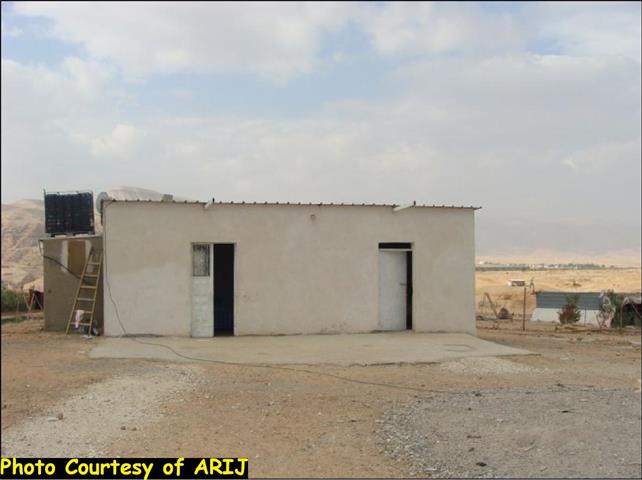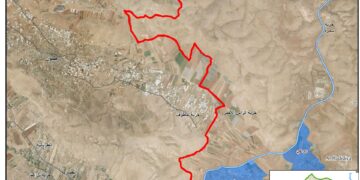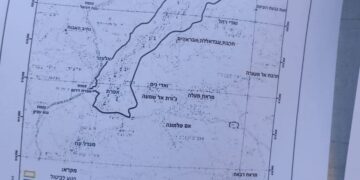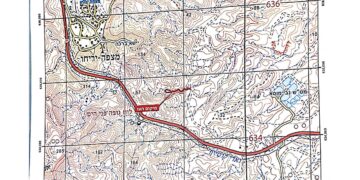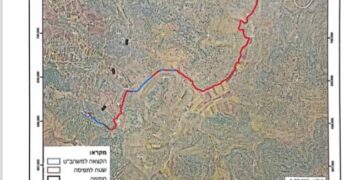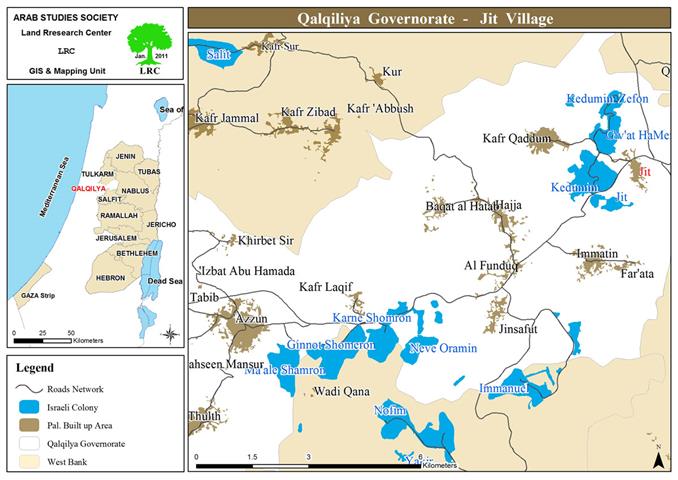The electricity poles which the Israeli Civil Administration threatens to extract have been installed in the area several months ago, with the support of the Palestinian National Authority at a cost of around 79 thousand NIS (New Israeli Shekels), in order to provide electricity to the community which also lacks other basic services such as water networks, sewage networks and telephone lines.
It is noteworthy that this is the second time in two months that the community of Arab Abu Zayed was targeted by the Israeli Civil Administration as it served the community on the 3ed of November 2010 another ten military orders stating the halt of construction of other structures in the community under the pretext of unlicensed building. The structures and their owners are detailed in Table 2 below
|
|
order №
|
Owner
|
Type of threatened Structure
|
|
|
1
|
146318
|
Hussein Muhammad Al Zayed
|
50 m² area structure
|
|
|
2
|
146319
|
Ibrahim Muhammad Al Zayed
|
50 m² area structure
|
|
|
3
|
146320
|
Saleh Muhammad Al Zayed
|
50 m² area structure
|
|
|
4
|
146321
|
Deifallah Muhammad Hussein Al Zayed
|
NA
|
|
|
5
|
146322
|
Odeh Muhammad Al Zayed
|
NA
|
|
|
6
|
146323
|
Suleiman Muhammad Al Zayed
|
50 m² area structure
|
|
|
7
|
146324
|
Saleh Muhammad Mahmoud Rashaydah
|
Sheep Barn of 50 m² area
|
|
|
8
|
146325
|
Sameer Muhammad Mahmoud Rashaydah
|
40 m² area structure
|
|
|
9
|
146326
|
Isma’il Muhammad Tareef Rashaydah
|
40 m² area structure
|
|
|
10
|
146327
|
Tayseer Muhammad Mahmoud Rashaydah
|
20 m² area structure
|
|
|
Reference: Arab Abu Zayed Community, 2011
|
Arab Abu Zayed Community (An Nuwei’meh Bedouins): Location & Population:-
Arab Abu Zayed community (An Nuwei’meh Bedouins) is located around 1 kilometer to the northwestern side of An Nuwei’meh village north of Jericho city. The community is considered part of An Nuwei’meh village boundary and has a total population of 350 (Head of Arab Abu Zayed community 2011). According to the Oslo II Interim agreement of 1995, the community of Arab Abu Zayed is located in ‘C’ area which falls under the full Israeli control. Palestinians living in Area ‘C’ must acquire building permits from the Israeli Civil Administration in order to be able to build and expand. To the northwest of Arab Abu Zayed community and around 1 kilometer away from it, lies an Israeli military base which contributed much to the obstruction of the community growth and development. The military base has also caused the displacement of many Bedouins families living in the area due to the activities that take place during military trainings which include fire shooting. See Map 1

Map 1: The location of the threatened Structures in Arab Abu Zayed Bedouin community
The suffering of Palestinian Communities in the eastern part of the West Bank (The Eastern Segregation Zone):
Following the Israeli occupation of the West bank and the Gaza strip in 1967, Israel targeted the eastern part of the West Bank by announcing vast areas of it as ‘Closed Military Areas’ with the aim of ceasing Palestinian urban and economic development to displace Palestinians from their place of residency, implement its colonial plans and strengthen its presence in this specific part of the West Bank. This policy constituted an obstacle to the growth of Palestinian communities in the eastern segregation zone as most of Palestinian communities are located in areas where construction is prohibited unless a building permit is granted by the Israeli Civil Administration. Israel has also depleted natural resources in the eastern part of the West Bank (the Eastern Segregation Zone) such as the agricultural lands and water sources (wells and springs) through the construction of artesian wells to divert water resources for the benefit of Israeli settlements in order to force Palestinian to leave.
The Israeli policies to take over lands in the eastern segregation zone came along with what Benjamin Netanyahu (the current Israeli Prime Minister) declared on June 3, 2005 and stressed on Israel’s unwillingness to give up areas in the eastern part of the West Bank where he said: “The Jordan valley won’t be included in any of Israel’s withdrawal plans. The Jordan Valley will remain under Israel’s control forever. It is Israel’s eastern defensive shield…We will not go back to the 1967 borders’
The Israeli demolition policy in the eastern segregation zone came to confirm the determination of the Israeli government to go forward with the implementation of its settlement plans, which were never set on the basis of security needs, military necessities, and unauthorized construction but with the aim to build Israeli settlements in the eastern segregation zone and East Jerusalem.
To conclude,
During the past few years, the Occupied Palestinian Territory witnessed an escalation in the number of structures (houses, barns, stores, etc) that were either threatened of demolition due to unlicensed building or demolished under the same pretext. This indicates the Israeli persistence to displace Palestinians from their places of residency to open the way for the implementation of Israeli colonial projects for the sake of Israeli settlers living in the OPT. Under the Fourth Geneva Convention, Israel, the occupying power, is prohibited from destroying the Palestinian properties.
-
Article 53 of the convention provides that: Any destruction by the Occupying Power of real or personal property belonging individually or collectively to private persons, or to the State, or to other public authorities, or to social or cooperative organizations, is prohibited, except where such destruction is rendered absolutely necessary by military operations.
-
Article 147 of the same convention indicated that: Extensive destruction and appropriation of property not justified by military necessity and carried out unlawfully and wantonly. is a grave breach of the Convention.
Article 23 of the Hague Convention of 1907 also provides: ‘In addition to the prohibitions provided by special Conventions, it is especially forbidden to destroy or seize the enemy’s property, unless such destruction or seizure be imperatively demanded by the necessities of war; ‘
Yet, Israel, which is a party to the Fourth Geneva Convention, claims and persists that the Palestinian territory do not go under the terms and custody of this convention. Amnesty International commented on the Israeli claims by noting that ‘
it is a basic principle of human rights law that international human rights treaties are applicable in all areas in which states parties exercise effective control, regardless of whether or not they exercise sovereignty in that area :::::::::::::::::

